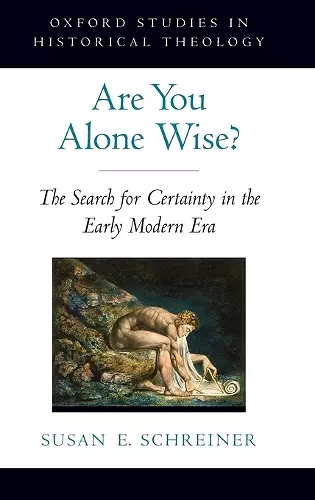Are You Alone Wise?
The Search for Certainty in the Early Modern Era
Format:Hardback
Publisher:Oxford University Press Inc
Published:27th Jan '11
Currently unavailable, and unfortunately no date known when it will be back

In present-day America, the topic of certitude is much debated. On one side, commentators like Charles Krauthammer urge us to achieve "moral clarity." On the other, those like George Will contend that the greatest present threat to civilization is an excess of certitude. In this book Susan Schreiner points out that Europe in the sixteenth century was preoccupied with similar concerns. Both the desire for certainty, especially religious certainty, and warnings against certainty permeated this earlier era. Schreiner analyzes the pervading questions about certitude and doubt in the terms and contexts of a wide variety of thinkers during this time of competing truths. The Protestant Reformation was the wellspring of this debate, which expressed itself in terms of questions about salvation, authority, the rise of skepticism, the outbreak of religious violence, the discernment of spirits, and the ambiguous relationship between appearannce and reality. Repeatedly, Schreiner says, we find the recurring fear of deception. She examines the history of theological polemics and debates as well as other genres to shed light on the progress of this controversy. Among the texts she draws on are Montaigne's Essays, the mystical writings of Teresa of Avila, the diary, letters, and treatises of St. Ignatius, and the dramas of Shakespeare. The result is not a book about theology, but rather about the way in which the concern with certitude determined the theology, polemics and literature of the age.
With characteristic breadth of mind and vision, Schreiner combines deep knowledge and understanding of the overlapping fields of theology, philosophy, spirituality, culture and literature in order to project a history of the erratic human mind. Such an adventurous, interdisciplinary approach is often vulnerable to exposure of superficiality and pretentiousness, but happily not in her case. Every sentence she writes is formed in a way that conveys illumination to the reader. * Ian Hazlett, Professor of Ecclesiastical History, University of Glasgow. *
This immensely interesting and thoughtful book places the quest for 'certainty' at the center of that era historians have recently come to call 'early modern.' A sensitive reader of texts, whether theological or literary, Schreiner places Protestant and Catholic reformers, Renaissance humanists and dramatists, and philosophical and literary skeptics on the same stage, all probing the same unsettling questions about human ends and how we can come to know them with any certitude. This is a book all students of early modern European history will have to come to terms with. * John Van Engen, author of Sisters and Brothers of the Common Life: The Devotio Moderna and the World of the Later Middle Ages *
Susan Schreiner's study of the search for certainty offers a masterful perspective on a central and many-faceted problem of the early modern era. The book is characterized by a mastery of sources primary and secondary and by profound insight into the intellectual and cultural transitions from the Middle Ages into modernity, ranging from philosophical problems of the fourteenth and fifteenth centuries, to Luther and Tyndale in the early Reformation, to Montaigne and Shakespeare at the end of the sixteenth century. This is a rich, rewarding, and highly significant study. * Richard A. Muller, P. J. Zondervan Professor of Historical Theology, Calvin Theological Seminary *
Susan Schreiner's wide-ranging study examines intellectuals' concerns over certainty...This method enables her to engage an impressive array of subjects and contexts...Her narrative thus makes many claims and raises many questions for further consideration. * Sixteenth Century Journal *
ISBN: 9780195313420
Dimensions: 168mm x 234mm x 46mm
Weight: 839g
504 pages